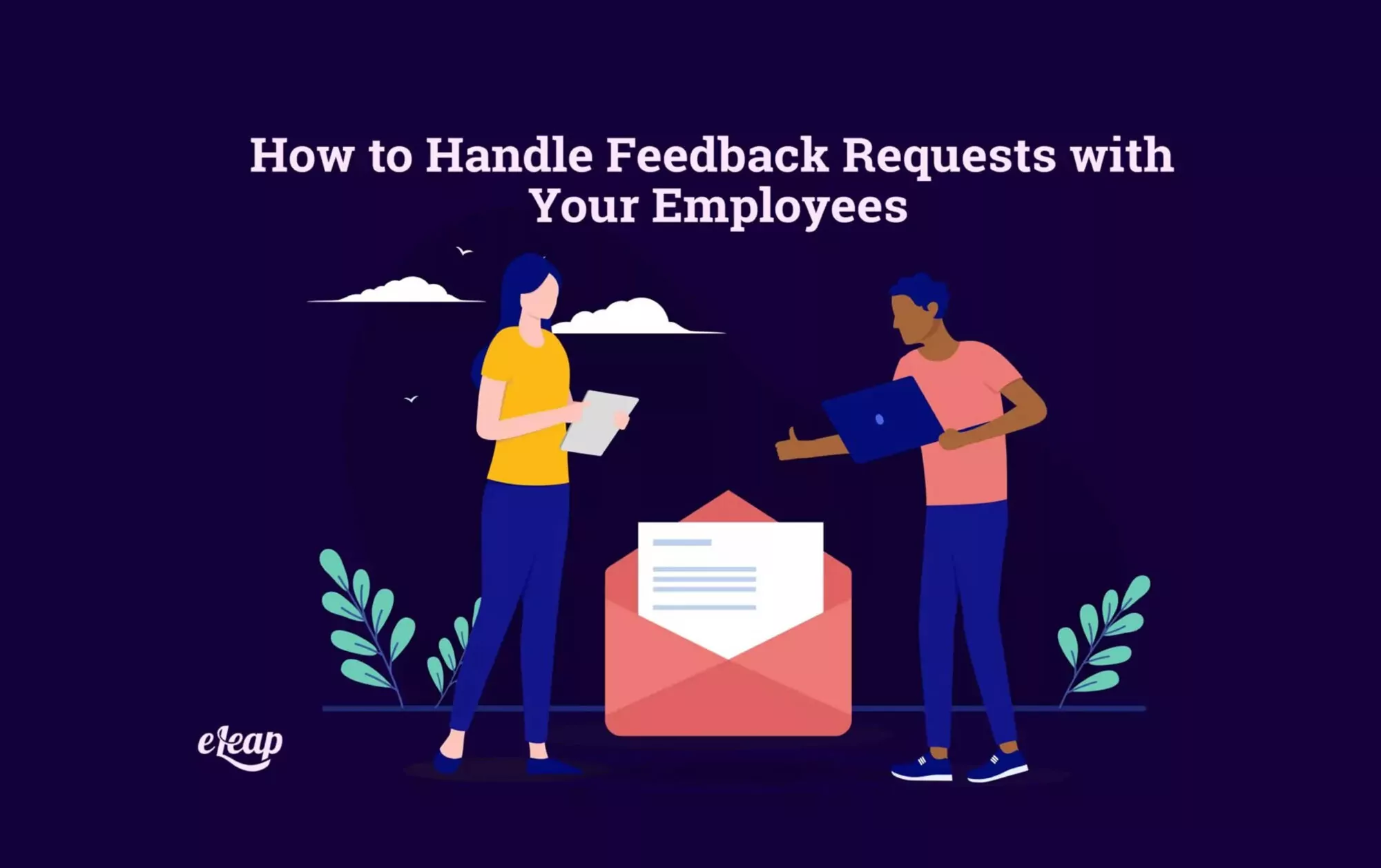How to Handle Feedback Requests with Your Employees

Do you want to allow your employees to send in feedback requests but are overwhelmed at the idea of handling them all? Feedback is a vital part of employee success, and allowing your employees to request feedback on their projects can help to make implementing feedback easier! Explore how eLeaP®’s Performance Management Platform can simplify evaluations, boost productivity, and drive measurable results.
Feedback Requests Should Be Based on What the Employee Wants
Allowing your employees to request feedback on a particular project or area of work can help to make the feedback more personal to them. When you give your employees feedback that’s based on general areas of work, but you aren’t asking what they want to work on, you’re not allowing them to reach their full potential.
When it’s time for a feedback session with your employees, ask them what projects they want your feedback on. When they receive the feedback they’re looking for, they’ll be more motivated and likely to take action on the feedback.
Feedback Requests Should Receive Quality Feedback
When your employee asks you for specific feedback, take the time to give them high-quality feedback. If you want your employees to keep coming back for your feedback in a proactive manner, you need to make it worth their while.
This doesn’t mean every piece of feedback has to be positive because that isn’t always possible. However, what it does mean is you need to give thorough, actionable feedback. This is true of all feedback you give, but it’s especially true of feedback requests you receive because they’re a sign that your employee wants to grow.
When you’re putting together feedback in response to a request, make sure it has these elements:
- Specific
- Actionable and goal-oriented
- Focusing on the project, not the employee
- Always end on a positive note

Consider Asking Your Employees for Feedback, Too
Feedback should be a two-way street in order to be the most effective. When you’re having feedback sessions with your employees, it’s a great time to put in your own feedback requests as well. Give your employees a candid time to let you know what they think is going well at work and what could be handled differently.
Of course, there’s a right way to handle receiving feedback as much as there is to giving it. Make sure you are fully equipped with the skills, mindset, and ability to take the feedback you get correctly and put it to good use. Fortunately, we have some tips on how to do that as well!
When to Voice Your Feedback Requests
The first step to getting feedback from your employees is asking for it at the right time. Depending on the type of feedback you’re looking for, the right time to ask for it can vary.
Before or After a Project
A great time to ask your employees for feedback on procedures is either right before you begin a project or right after you complete one.
If you ask for actionable feedback before the project begins, that project can be a great time to try out proposed changes. Of course, if you have a large and important project about to start, it may not be the right time to implement changes. Even then, though, you can have the feedback in mind and consider it throughout the process.
When you ask for feedback from your employees right after a project, the process from start to finish is fresh in their minds. This will allow them to have relevant examples of what worked and what didn’t, along with current ideas of how you could change the process in the future for a smoother experience.
During a Performance Review
Assuming your company does regular performance reviews, this is a perfect time to get one-on-one feedback from your employees. After you give your employee their review, allow them time to review your performance. This can take a lot of courage, but it’s a great opportunity for you to see areas where you can grow as a leader.
Try to make the setting casual instead of making it feel like a formal review, and you’ll be more likely to receive the kind of feedback you’re hoping for. Ask your employees questions and listen intently to the answers they give you.
How to Receive Helpful Feedback
Now that you know good times to ask for feedback, you still need to know the best ways to make sure you get feedback that’s worthwhile. In order to get that from your employees, they have to trust you enough to be open and honest about their opinions. Fortunately, there are some ways you can help cultivate this kind of environment.
Ask About the Future
Don’t spend time asking about issues your employee has had over the last few months. This can become a bit of a rabbit hole and isn’t very constructive. Instead, ask about how they would like things to be done moving forward. This will give you actionable ideas instead of just personal complaints.
Ask Direct Questions
Don’t simply ask your employees how they feel about certain elements of their job. Ask them specific questions about the topic you want feedback on. Not only will this help you get feedback on the areas you’d like it, but it can help direct your employees to a particular answer instead of being vague with responses.
Let Them Be Honest
Your employee might start out being concerned about being candid about their opinions. Make sure they know you want them to be completely honest and that it will be more helpful if they are. It can be intimidating to give feedback about your boss to your boss, so let them know it’s okay to not hold back.
How to Respond Once You Get Feedback
How you react to the feedback your employees give will set the stage for whether they give you more feedback in the future, as well as the culture of your workplace in general. If you’re sending out feedback requests, it can be detrimental for you to react poorly to the feedback you receive.
When you receive feedback professionally and positively, it can help foster a culture of trust and respect between you and your employees. In order to make sure you’re responding correctly, keep these tips in mind.
Don’t Get Defensive
It can be easy to argue with your employee’s feedback about your work. However, this can be disrespectful and hurt the working relationship you have with them. Just like you wouldn’t want them to argue with your feedback to them, don’t express an argumentative tone in response to their feedback to you.
Make sure your body language doesn’t come across as defensive, either. Don’t do things like cross your arms while you’re receiving feedback in order to avoid seeming closed off or upset.
Listen Intently
Make sure you’re keeping eye contact with your employee while they give you their feedback. Listen much more than you talk but take time to nod or respond with quick statements that show you’ve been listening. If the situation allows for it, take notes on the ideas and feedback your employee offers so you can look back on it after your session ends.
Don’t Make Promises You Can’t Keep
When the feedback has concluded, don’t immediately promise to make the changes suggested. Instead, let your employees know that you’ll consider the points they made and think them through to see how they would be best implemented. Not every piece of feedback you receive from your employees will be usable, but it’s a good idea to consider each one completely before making decisions.
After letting them know you will consider everything they suggested, make sure you thank them for their honesty and courage throughout the process. Showing your appreciation can go a long way in terms of getting them to open up again.
Follow Up
Finally, make sure you’re following up on the feedback you receive. When you promise to consider ideas, take the time to determine how they can be implemented or whether they’re a good option for the workplace.
Once you’ve given each piece of feedback the thought it needs, go back to your employees and follow up with them. Let them know what actions you’ve taken in response to their feedback. This can help them feel like they’ve truly helped to better the workplace, which can help their morale and work ethic.
If there are pieces of their feedback you aren’t utilizing, explain why. Letting them know the thought process and reasons for not using a suggestion can help them know you thought it through and truly considered every option.
Either way, make sure you let your employee know what decisions you make in response to their feedback. If you don’t, they may feel you didn’t listen to them or just simply ignored their opinions, which can hurt morale and trust tremendously.
Takeaway
Allowing employees to put in feedback requests can allow them to receive feedback on elements of their work that they truly care about. However, feedback for your employees is only half the feedback culture you should be utilizing. Allowing your employees to give you feedback on the workplace and your management skills can help create a trusting, positive work environment where everyone is more accepting of the feedback they receive!